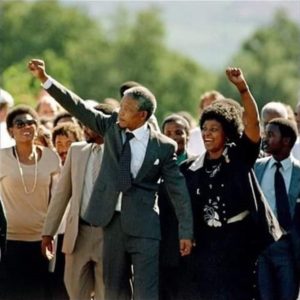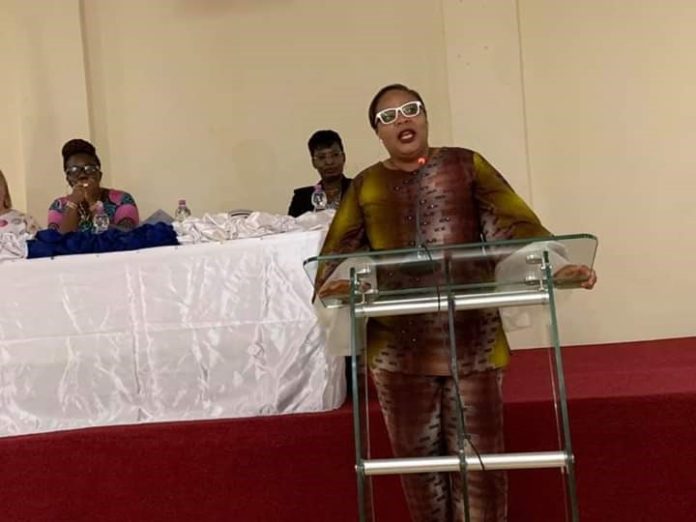By Daniel Garteh
International human rights and women rights activist Madam Leymah Gbowee has cautioned leaders of Africa to work assiduously to bring a generation of young people to step in their shoes in making positively changes in Africa.
Serving as keynote speaker at the 30th anniversary marking the release of Nelson Mandela from prison at the Cape Town’s City Hall in South Africa, Madam Gbowee said that there is a need for the young generation to carry out the vision of educated population of youth, an empowered, recognized and valued population of women.
The 30th anniversary of Nelson Mandela’s release from prison was organized by the Nelson Mandela Foundation under the theme “the new prisons of Africa.”
Former Rights activist and the first black president of South Africa Nelson Mandela spent 27 years in prison for his stands against the Apartheid, White supremacy and racial segregation in South Africa.
Mandela was released from prison on February 11, 1990.
The 2011 Nobel Prize winner who spoke on the Topic “The prisons of Africa” disclosed that there is needs for people to Sacrifice have Compassion, Service to the continent and collective effort to humanity.
“Today, we gather to remember the sacrifice that this great man made during his imprisonment. He had powerfully declared during his trial that he would gladly give up his life for his ideals of a society based on equality, democracy and freedom.
He dedicated his life in service to African independence and in his quest to reconcile and reunite South Africa, he showed deep compassion and understanding.”
The Orator explained that Nelson Mandela provides the continent with a powerful example of the ethic of Ubuntu, that they are all connected and even though they are all complicated and flawed beings, each and every one of the continent has a role to play in building the legacy of our collective humanity.
She cautioned the gathering to ask themselves as Africans in general and South Africans in particular, what are these values of sacrifice, compassion, service and collective humanity still key features of our everyday existence, “Can we say all of these remain prominent in our politics, religious expression, social justice activism, educational systems and structures and our daily interactions”?
Madam Gbowee termed prison as a points of restriction of movement, confinement, the denial of a variety of freedoms, a form of punishment and can also be used as a tool of political repression.
The 30th anniversary Orator mentioned that the African continent today, have many prisons and many prisoners in the formal sense of the word.
She termed the prisoners as those who steal rapists, drug addicts, murderers, and many of those individuals who go against the laws of our land.
“We put them away and often refer to them as social deviants and individuals whose intentions are solely to destroy the peace and tranquility of our land. By isolating those who wish the society ill, the theory goes, our communities should be functional and every individual will enjoy the provision of the basic human security needs.”
She lamented that the continent is riddled with so many vices that you would think the sustainable development goals were designed and instituted only for Africa.
Gbowee further mentioned that Africa is blessed with wealth and natural resources and a youthful population, but this has failed to give us the necessary tools for a better life.
She decry that Africa political systems and democratic institutions are structured to turn the “the masses into “asses” and politicians into “emperors”. Sadly, many of the current day “emperors” – those who claim to lead our peoples – are lacking in leadership qualities. Where is the vision for our continent and our peoples, Where is the faith that African cultures and innovations offer the solutions to our collective ills when properly invested in.
Dictatorship in Africa
Rather, too many in leadership roles seem more content with prolonging their stay in power and filling their Swiss accounts with funds that could be used to educate, heal, feed and train the vast majority of their population. Sadly, politics and governance has become the fastest way to gaining wealth on our continent.”
She claimed that Africa’s prison is the mindset of its people, Africa prison is the insensitive attitude of its leaders. Africa’s prison is the hopelessness in the eyes of the young people due to the lack of opportunities.
Africa’s prison is the repeated rape, abuse and marginalization of the women of the continent. Africa’s prison is the existence of conditions that makes it easy for our young people to take up arms and kill their own people all in the name of revolution.
Africa prison is the division of its communities on the basis of ethnicity, religion, sexual orientation. Africa’s prison is the poor health infrastructure that has normalized maternal death and infant mortality.
Africa’s prison is the millions of individuals who are graduates of universities but cannot afford one square meal a day. Africa’s prison is the justice system represents the needs of primarily the rich and famous.
She further mentioned that Mandela was confined, his movement was restricted, but his physical prison cell was not reflected in an imprisonment of his mind or spirit.
“In prison his values for life and the betterment of life for his people guided him. His principled stance to protect collective humanity guided his thoughts and plans, which became more expansive and more clearly articulated. Whilst locked away, he could write and dream of a rainbow nation. He came out and was able to speak peace and reconciliation.
Being locked away did not take away his humanity. He didn’t come out bitter and with machete to kill those who restricted his movement. He came out with a message of hope, peace and the greater good of all. Service, Sacrifice, Compassion and our Collective humanity.”

She admonished people who gather for the occasion to truly honor the legacy of this great father of Africa, leaders on the continent to make a conscious effort to realign their individual and collective priorities so that it reflects the interests, needs and aspiration of the people. There must be a transformation in the mindset of the political leadership in Africa adding that Africa is not a plantation and politicians farm.
The Noble Peace winner revealed that the shared resources must be governed with integrity, with development in mind and not to steal.
The rights activist Madam Leymah Gbowee said that values she sees in Nelson Mandela’s life present a roadmap to peace and development cautioning if Africa’s leaders and citizens can adopt an ethic of sacrifice, compassion, service and collective humanity, they can create the conditions necessary for each and every human on the continent to live a dignified life.
“The opening of those prison doors was much more than a man walking out. It was about the rebirth of a nation and a continent. It is about laying a path for generations unborn, it is about a continent taking full control of her resources, her politics and her history”
She concluded that Mandela walking out of prison was to ensure Africa’s release from the prison of its minds where there is no need to be held hostage to greed, poverty, and corruption.






















